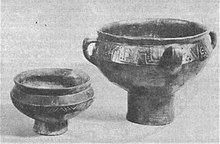Przywóz
Przywóz | |
|---|---|
Village | |
 Ducal Kurgan II in Przywóz | |
| Coordinates: 51°9′N 18°43′E / 51.150°N 18.717°E | |
| Country | |
| Voivodeship | Łódź |
| County | Wieluń |
| Gmina | Wierzchlas |
| Time zone | UTC+1 (CET) |
| • Summer (DST) | UTC+2 (CEST) |
| Vehicle registration | EWI |
Przywóz [ˈpʂɨvus] is a village in the administrative district of Gmina Wierzchlas, within Wieluń County, Łódź Voivodeship, in south-central Poland. It lies approximately 7 kilometres (4 mi) south-east of Wierzchlas, 13 km (8 mi) south-east of Wieluń, and 88 km (55 mi) south-west of the regional capital Łódź.[1]
History
[edit]
In the village there are two prehistoric tumuli and a settlement of the Przeworsk culture, dating back to the 2nd century AD, now an archaeological site.[2] Named the "Ducal Kurgans", they are linked to a local section of the ancient Amber Road connecting the Baltic Sea with the Roman Empire.[2]
In the 16th century, the inhabitants of Przywóz were minor nobility.[3] In the late 19th century, Przywóz had a population of 187.[3]
During the German occupation of Poland (World War II), in 1940, the German gendarmerie carried out expulsions of Poles, who were placed in a transit camp in Łódź, and then young Poles were deported to forced labour in Germany and German-occupied France, and others were deported to the General Government in the more eastern part of German-occupied Poland.[4] Houses and farms of expelled Poles were handed over to German colonists as part of the Lebensraum policy.[5]
In 1964–1974, a team of archaeologists led by professor Konrad Jażdżewski of the Museum of Archaeology and Ethnography in Łódź conducted archaeological research on the tumuli in Przywóz.[2]
References
[edit]- ^ "Central Statistical Office (GUS) – TERYT (National Register of Territorial Land Apportionment Journal)" (in Polish). 2008-06-01.
- ^ a b c Zbigniew Lechowicz. "Zespół osadniczy". Zabytek.pl (in Polish). Retrieved 24 April 2023.
- ^ a b Słownik geograficzny Królestwa Polskiego i innych krajów słowiańskich, Tom IX (in Polish). Warsaw. 1888. p. 243.
{{cite book}}: CS1 maint: location missing publisher (link) - ^ Wardzyńska, Maria (2017). Wysiedlenia ludności polskiej z okupowanych ziem polskich włączonych do III Rzeszy w latach 1939-1945 (in Polish). Warsaw: IPN. p. 253. ISBN 978-83-8098-174-4.
- ^ Wardzyńska, p. 255

